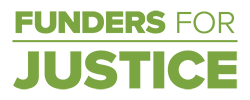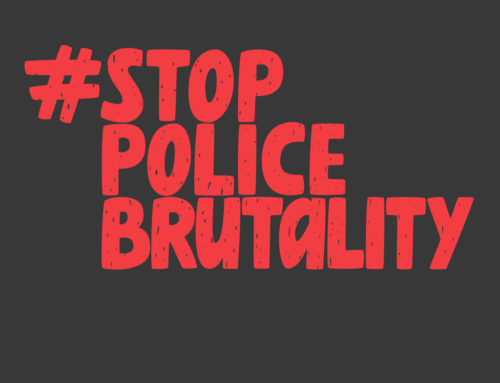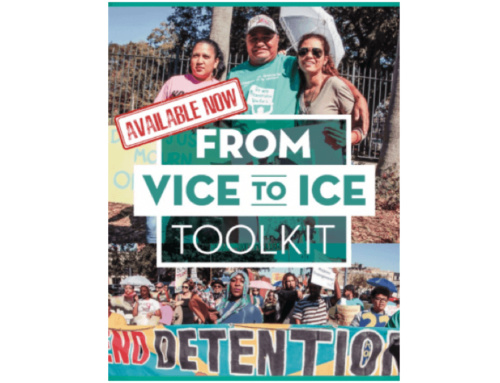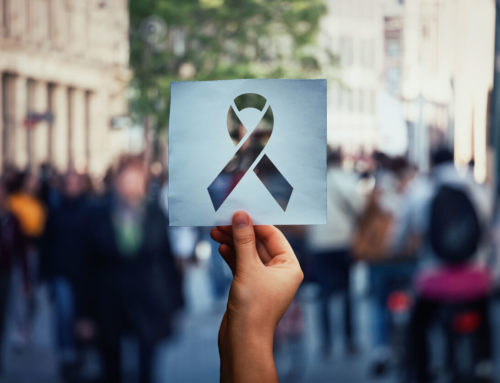By Connie Cagampang Heller and Alexander Saingchin
National Committee for Responsive Philanthropy, Fall 2015
Police Shooting Kills Sleeping 7-Year-Old Girl During Drug Raid.
Police Kill 12-Year-Old Boy Playing with Plastic Gun.
Young Man, 14 Years Old, Tried as an Adult.
Woman Who Acted in Self-Defense Now Serving Life Sentence
Have you found yourself thinking something urgently needs to change after seeing headlines about the latest abuses perpetrated by the criminal justice system? How did criminalization become a defining characteristic of American society? What can we in philanthropy do about it? In this article, we will look at some of the reasons why, as a society, we have taken a punitive approach to criminal justice, give some examples of how people who are directly impacted are creating change, and finally offer three philanthropic strategies to support authentic partnerships with movements challenging mass incarceration.
Sadly, it may not surprise you to learn that the victims in each of the previous stories were people of color. But perhaps it might surprise you that a recent study published by Stanford University shows that white people are more likely to support harsh criminal justice policies even when they know those policies disproportionately apply to people of color. When shown a video of mug shots, white San Franciscans were more likely to support reform if the video included a higher percentage of white people than if it included a higher percentage of African Americans. In other words, rather than being moved to action by the injustice of dramatic racial disparity, the participants continued to support a punitive, rather than rehabilitative, approach when confronted with a racially-biased criminal justice system. Indeed, racial prejudice can be subconscious and deeply rooted.
Mass criminalization is an expression of underlying racism and implicit bias that has been present, both structurally and culturally, in our society for decades. Policies at the local, state and federal levels have been designed to exclude certain groups, notably Black and Native people – fortifying a labyrinth of barriers to full political participation with the cumulative effects of social oppression, reduced economic choice and multigenerational trauma. The Making of Ferguson by Richard Rothstein highlights how past and present housing, banking and education funding policies continue to segregate and discriminate against communities of color in cities across the country.
Mass criminalization is an egregious area of racism and segregation in our country. Richard Nixon’s “War on Drugs” has caused the U.S. to spend billions of dollars on arrests and prison sentencing that disproportionately target communities of color and dehumanize Black people in particular, with catastrophic outcomes for these communities and the erosion of Civil Rights Era gains. The California Endowment’s Do the Math: Schools vs. Prisons campaign revealed that Californians “spend $62,300 a year to keep one inmate in prison, and just $9,100 per year per student in our public schools.” But, in the past 35 years, California has built 22 new prisons, but only one campus for the University of California. These spending choices come at a huge societal cost for everyone and lay bare the extent to which we have reinstated cultural and legal criminalization and ultimately social separation of people of color.
Given this cultural and political backdrop, addressing mass criminalization requires structural solutions to dismantle unjust policies and their effects. We need to build a movement that proffers an expansive vision of who belongs and a policy platform that holds membership and inclusion for all communities as its central principle – and establishes political power for communities with less of it.
To do this, funders will need to learn to partner authentically with those most impacted by the reaches of the criminal justice system to advance short- and long-term solutions that shift how society views formerly incarcerated people (disproportionately people of color) and their families. Grassroots, community-led groups that organize those directly affected by an issue are best positioned to understand the needs of these communities – and have the appropriate solutions to solve them. These groups work to be accountable to their community, activating community members to participate in political action that addresses the root causes of structural racism and the policies that embody it. By coming together with allies and the resources needed to succeed, these groups are building movements that challenge the stories we tell about ourselves and each other and ensure that we have a healthy democracy by and for the people.
Take, for example, the growing movement to end hiring discrimination against formerly incarcerated people (FIPs). In 2003, community organizers who had been formerly incarcerated convened in Oakland and New Orleans to discuss the challenges their communities faced, including the lack of voting and employment rights, as well as other issues that affect people in prison and after their release. They agreed to organize both locally and nationally under the banner All of Us or None (AOUON), and to prioritize a campaign to “Ban the Box,” or remove the check box for convicted felons on applications for public employment.
What followed was simply inspirational. By organizing FIPs and their families, investing in their leadership and building long-term alliances with other grassroots groups, AOUON won numerous victories across the country. San Francisco was the first municipality to Ban the Box on public employment applications; other cities in California followed. In 2011, AOUON helped found the Formerly Incarcerated and Convicted People’s Movement (FICPM), a bottom-up alliance of groups organizing FIPs that gave an added boost to the national Ban the Box campaign. Now, more than 100 cities or counties and 18 states have removed questions about conviction history from their public employment applications, and President Obama is considering an executive order to do so for all federal contractors. The campaign continues with its expansive vision to Ban the Box everywhere, including on housing, business and professional licensure applications. It seeks to end all forms of discrimination against people with criminal records, and truly offer people a fair chance.
These victories required the development of political power for those with little of it and applying a racial justice lens. AOUON is committed to bringing the people most impacted by mass criminalization into the movement to share their struggles and appeal to elected officials. To overcome long-held racial stereotypes and advance policy change, we must show the humanity of people with past convictions. It is easy to mistreat an anonymous “criminal” other; it is quite different to relentlessly punish someone you know and care about. Indeed, AOUON’s victories have come from telling real stories about real people’s lives – and empowering those same people to make visionary demands of our democracy.
This is just one example; the movement to end mass criminalization provides many more. The imperative for funders is to support these efforts without getting in the way (a historical challenge). This requires authentic partnership with movement. Here’s how:
- Support grassroots, community-led groups that organize those who stand most to win or lose from an issue, and codesign funding priorities with them. AOUON developed the Ban the Box campaign by advancing a vision created by impacted communities, cultivating leadership within those communities and building a broad political base ready to demand action to address structural racism and the policies that embody it.
- Support regional and national convenings of groups organizing FIPs, their families and families with incarcerated children to facilitate movement-building. Funding for grassroots organizing has been far too limited, inhibiting community-led groups from engaging in the critical relationship-building and strategy alignment needed to build a stronger criminal justice reform movement. Funders need to provide sufficient resources to groups to design these convenings (including planning time, travel funds and support for facilitation) so those involved can create their own agendas and work toward desired outcomes.
- Approach the issue with root causes in mind – and where they intersect with other issues – with the long-term aim to dismantle structural racism and build a new paradigm of inclusiveness and belonging. Several community-led and movement groups have already developed analysis on the intersection between criminal justice, immigrant rights, LGBTQ rights and/or corporate accountability. For example, it is no coincidence that the private prison industry has lobbied aggressively for regressive policies around prison construction, immigration detention and expanded policing. Groups such as Enlace, BreakOUT!, Black Alliance for Just Immigration, PUENTE Human Rights Movement and FIERCE are making these connections, helping build a stronger movement. They are supported by funder collaboratives, like the Sunrise Fund, that recognize the power of policy-change campaigns led by the people most impacted.
Yes, something does have to urgently change if we want to stop the inhumane treatment and senseless killings of low-income Black, Brown and Native people. Philanthropy can and must play a role. The road to belonging starts by acknowledging that conscious and unconscious racial animosity has been a driving force in shaping the policies that led us to this era of mass criminalization. If we are to not only undo the harm that it has already caused, but also to advance an inclusive and just vision for society, philanthropy must walk in authentic partnership with the movement toward racial justice that has sprung up all around us. Is philanthropy up to the task?
Connie Cagampang Heller of the Linked Fate Fund for Justice at Common Counsel Foundation has been actively engaged in grantmaking and donor organizing for more than a decade. The Linked Fate Fund supports grassroots organizing and intermediaries dedicated to dismantling systemic racial inequity and building inclusive democracy. ‘
Alexander W. Saingchin, program officer at Common Counsel Foundation, oversees a set of family foundation and donor-advised fund portfolios with a strong focus on racial justice. Common Counsel Foundation also hosts the Social and Economic Justice Fund, a pooled fund for movement building that has recently focused on criminal justice reform.
Read the original post on NCRP.org.



